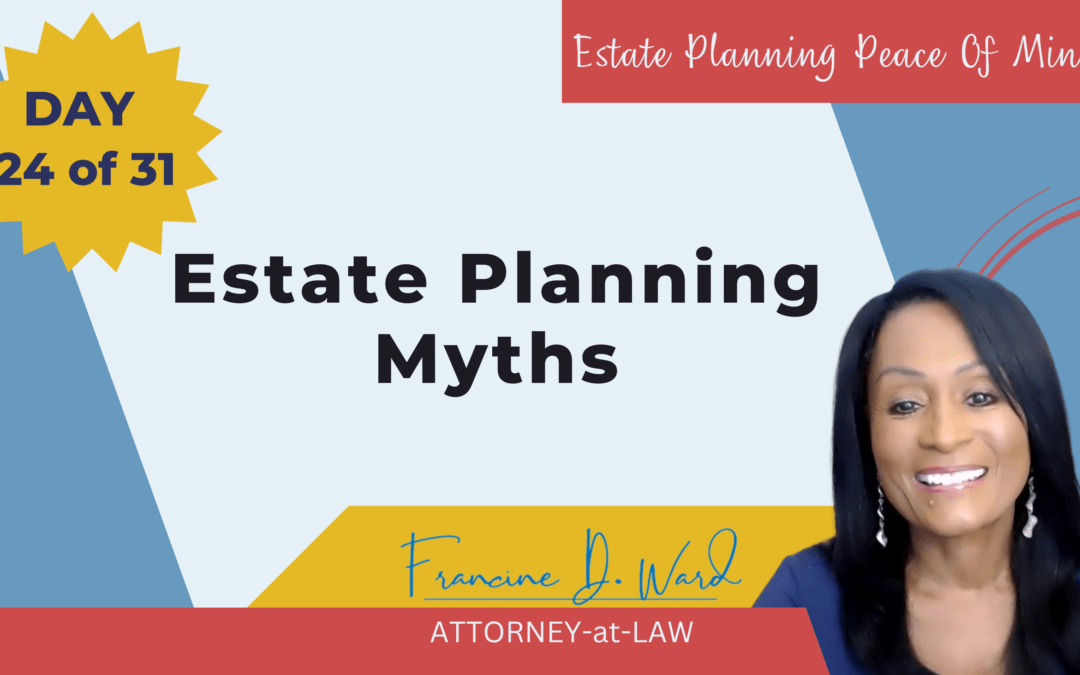Estate Planning Myths are a cause for trouble. Myths are widely held but false beliefs. People talk themselves out of creating an estate plan for many reasons. Considering the overall benefits, I ask, are those reasons valid? Perhaps, but perhaps not. Buying into estate planning myths can create more serious problems in the long run. Here are just four of the myths:
Myth #1: My Spouse Will Get Everything So Why Should I Worry.
Often, when couples own assets jointly, when dies, the surviving spouse becomes the sole owner. In many cases, married individuals prefer this outcome. But while this might be convenient, this is not necessarily the smart way to handle this. Why? Because without a trust, there is no asset protection for the surviving spouse. For example, if property is owned by the individual, it becomes available to creditors.
Myth #2: Only the Rich Need an Estate Plan.
Often when we think of estate planning, we think of rich people. Rich people a lot of assets, so of course THEY need estate planning. In contrast, when the average person thinks about their assets, they falsely assume that their possessions don’t warrant protection. This thinking is further from the truth. Estate planning is about more than just money. While proper planning allows you to determine who gets your money and property upon your death, the planning process also addresses what happens if you become incapacitated and someone has to make decisions on your behalf. That is a more realistic and likely scenario. If there is no estate plan, the court will make the decision for you
Even if your means are modest, you should consider who gets your hard-earned savings when you die. If you have no plan, state law will decide who gets what, and many times, the government’s best guess as to what you would have wanted is contrary to your actual desires. But because you did not take the opportunity to formalize your wishes in an estate plan, the state has to step in.
Myth #3: A Will Avoids Probate.
Many people think a will avoids probate. Not true. While a will is an effective way to appoint someone to wind up your affairs, determine who gets your assets (regardless of how few), and, if necessary, appoint a guardian to care for your minor children, a will must be probated. The level of the probate court’s involvement varies depending on the circumstances. In some states, if the value of your estate (i.e., what you own at your death) is below a certain amount (a small estate), anyone who is entitled to inherit from you can file a petition and have the money and property distributed without the traditional probate proceedings. The filing may require court appearances and formal legal notices to anyone who might be interested before your money and property can be distributed.
A Will is a Private Document.
Totally wrong. Unlike trust administration, probate proceedings are public. That means anyone can see what you have and who gets what.

Francine D. Ward
Attorney-At-Law, Author, Speaker
Follow Francine:
Don’t miss Francine’s Latest Blogs:
- What is a Habit?As we enter springtime, you may feel far away from your New Year’s resolution. That may be because of the success rate of NYE resolutions. In fact, January 17 is… Read more: What is a Habit?
- Common Contract MistakeCommon Contract Mistake #1. Not Having Written Agreements with EVERYONE You Do Business With. Common contract mistake. Without question, the most common contract mistake is not having the terms of… Read more: Common Contract Mistake
- AI and PatentsAI and Patents. Understanding Patent Law in the Age of AI. Patents, along with Copyrights, Trademarks, Trade Secrets, and Rights of Publicity, are one of the five areas of practice… Read more: AI and Patents
- Effective Goal SettingSetting Goals. It’s that time of year, time to plan for effective goal setting. A time when some of us start thinking about goals for the upcoming year. If you… Read more: Effective Goal Setting
- Indemnify AI UseBeware of companies that say they will indemnify AI use, that they will pay ALL the legal costs incurred by customers using Generative AI services (like ChatGPT, CoPilot, or Bard).… Read more: Indemnify AI Use












